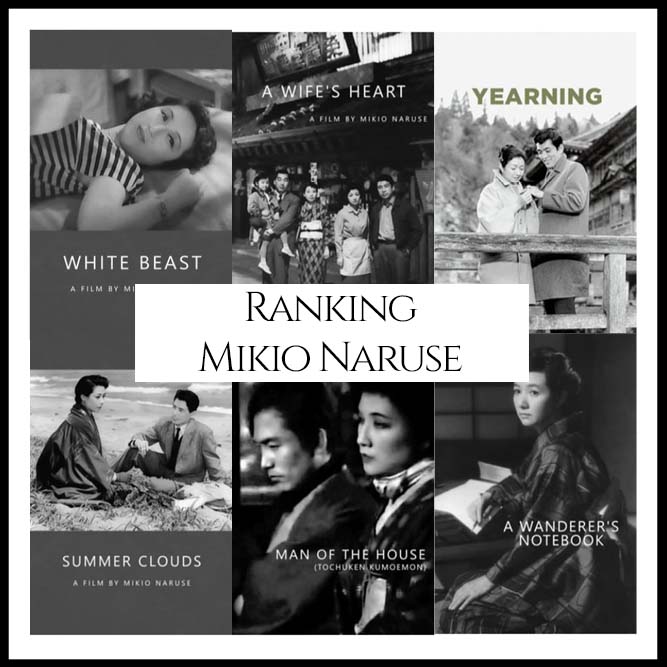Ranking All Of Director Mikio Naruse’s Movies
“What are Mikio Naruse’s Best Movies?” We looked at all of Naruse’s directed filmography and ranked them against one another to answer that very question!
We took all of the movies directed by Mikio Naruse and looked at their Rotten Tomato Critic, Rotten Tomato User, IMDB, and Letterboxd scores, ranking them against one another to see which movies came out on top. The movies are ranked in our list below based on which movies have the highest overall score between all 4 review sites in comparison with all of the other movies by the same director. The process is all very scientific with no flaws at all.
The full ranking chart is also included below the countdown on the bottom of the page.
Happy Viewing!
The Top Film’s Of Mikio Naruse
67 ) Furyô shôjo (1949)
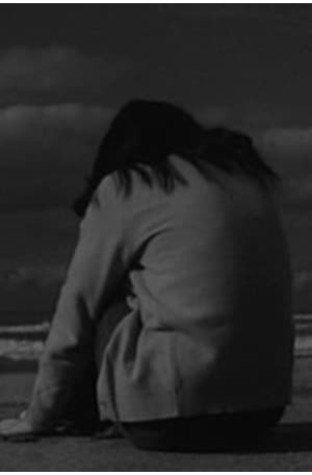
Review Website Ranks:
- Rotten Tomatoes Critic: 2
- Rotten Tomatoes Users: 21
- IMDB User Review Score: 67
- Letterboxd User Score: 53
“Delinquent Girl” – A melodramatic love story, a would-be apprenticeship between the titular “bad girl” and the optimistic scholar returning from the big city.
66 ) A Descendant of Urashima Taro (1946)
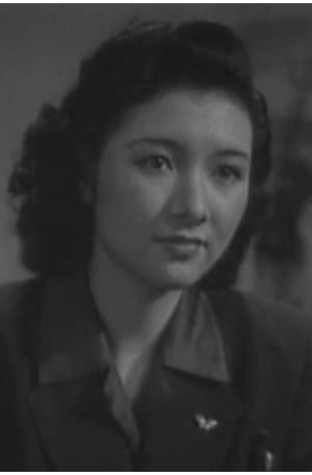
Review Website Ranks:
- Rotten Tomatoes Critic: 2
- Rotten Tomatoes Users: 21
- IMDB User Review Score: 65
- Letterboxd User Score: 53
Reputedly based on Frank Capra’s 1939 film Mr. Smith Goes to Washington, A Descendant of Tarô Urashima is about a repatriated soldier who becomes populist politician in the Japanese Happiness Party.
64 ) Tochuken Kumoemon (1936)
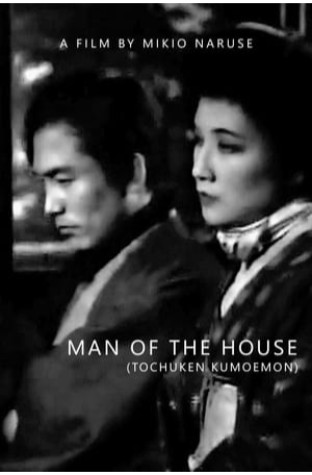
Review Website Ranks:
- Rotten Tomatoes Critic: 2
- Rotten Tomatoes Users: 21
- IMDB User Review Score: 64
- Letterboxd User Score: 53
This film is based on a real Meiji era performer — and tells of Tochuken’s partnership with his wife (played by Chikako Hosokawa) who played shamisen for his songs/recitations), his affair with a geisha (Sachiko Chiba), and the deterioration of his partnership and marriage.
64 ) The Road I Travel with You (1936)
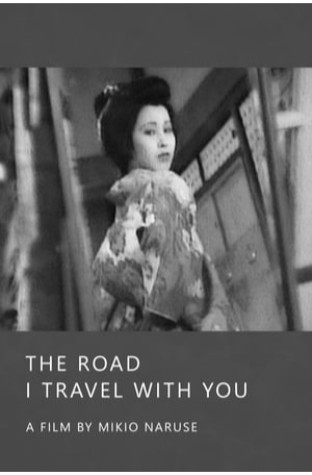
Review Website Ranks:
- Rotten Tomatoes Critic: 2
- Rotten Tomatoes Users: 21
- IMDB User Review Score: 65
- Letterboxd User Score: 52
The otherwise promising young man Asaji (Heihachirô Ôkawa) and his younger brother Yuji (Hideo Saeki) face blighted lives because of society’s disapproval of their illegitmacy and déclassé family.
63 ) This Happy Life (1944)

Review Website Ranks:
- Rotten Tomatoes Critic: 2
- Rotten Tomatoes Users: 21
- IMDB User Review Score: 62
- Letterboxd User Score: 53
A small community in wartime Japan learn how to make do with less.
62 ) Battle of Roses (1950)
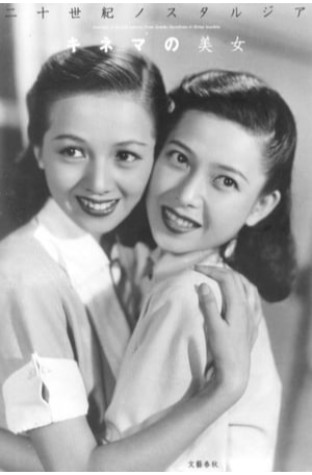
Review Website Ranks:
- Rotten Tomatoes Critic: 2
- Rotten Tomatoes Users: 21
- IMDB User Review Score: 61
- Letterboxd User Score: 53
A Japanese melodrama about three sisters, rival fashion companies, and attempted murder by overheated bathroom.
61 ) The Actress and the Poet (1935)
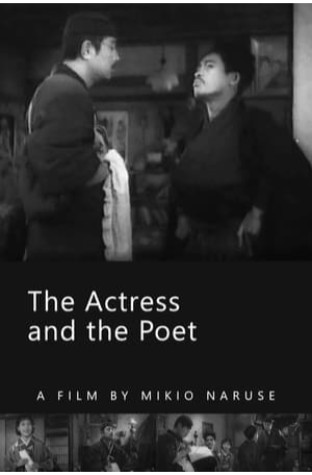
Review Website Ranks:
- Rotten Tomatoes Critic: 2
- Rotten Tomatoes Users: 21
- IMDB User Review Score: 62
- Letterboxd User Score: 49
Among the tight-knit neighbours are a poet, his actress wife, a bachelor budding author, a tobacco shop owner-cum-landlady, an insurance salesman and his nosy and greedy wife. Enter a young and seemingly high-class couple who just so happens is open to purchasing life insurance from their swift neighbour. In the meantime, life is imitating art across the street, which may end up providing for either a happy ending or a rude split – eventually that is.
60 ) The Way of Drama (1944)
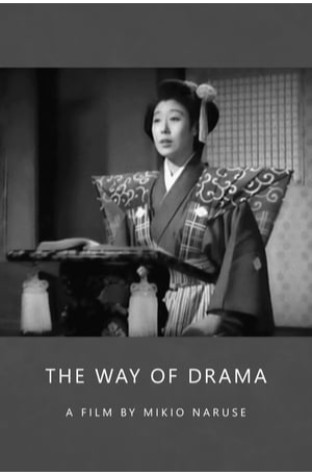
Review Website Ranks:
- Rotten Tomatoes Critic: 2
- Rotten Tomatoes Users: 21
- IMDB User Review Score: 57
- Letterboxd User Score: 53
The Way of Drama unfolds in the world of kabuki in Osaka, but also addresses the politics of popular culture and the rivalry between theatrical styles like those used by amateur actors to dramatise contemporary events.
59 ) Mother Never Dies (1942)
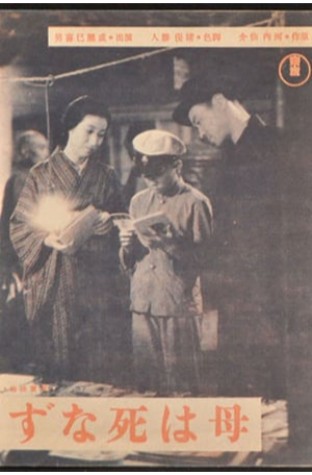
Review Website Ranks:
- Rotten Tomatoes Critic: 2
- Rotten Tomatoes Users: 18
- IMDB User Review Score: 57
- Letterboxd User Score: 53
The premature death of a young mother serves as inspiration for her husband and son.
54 ) Learn from Experience, Part Two (1937)
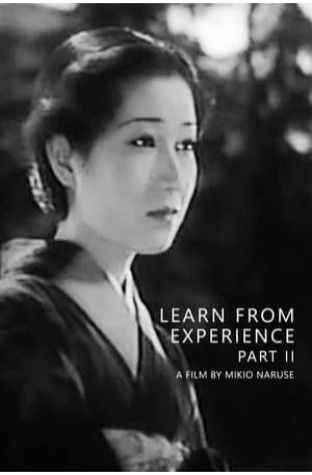
Review Website Ranks:
- Rotten Tomatoes Critic: 2
- Rotten Tomatoes Users: 21
- IMDB User Review Score: 53
- Letterboxd User Score: 53
Part 2 of a 2-part romance (fist part – Kafuku zempen) based on a story by noted author Kikuchi Kan. In the second half, we discover that Toyomi is pregnant — and while Shintaro and Yurie are on their extended honeymoon, she bears his child, a girl named Kiyoko. She is supported in adversity by Michiko — and gets considerable moral support from not only her own mother but also from Shintaro’s mother and siblings. Even more surprisingly, Yurie strikes up a friendship of sorts with her. When Yurie learns that the child is Shintaro’s, she convinces Toyomi that it would be best to let Shintaro (and her) raise Kiyoko, so Toyomi can get on with making a proper life for herself. Tearfully, Toyomi agrees. Sometime later, Michiko goes to visit Toyomi — and sees her at work, as a kindergarten teacher.
54 ) Four Love Stories (1947)
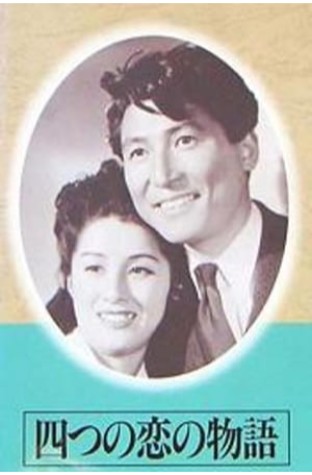
Review Website Ranks:
- Rotten Tomatoes Critic: 2
- Rotten Tomatoes Users: 21
- IMDB User Review Score: 53
- Letterboxd User Score: 53
Omnibus of love stories from 1947 directed by famous directors, featuring big stars.
54 ) Conduct Report on Professor Ishinaka (1950)
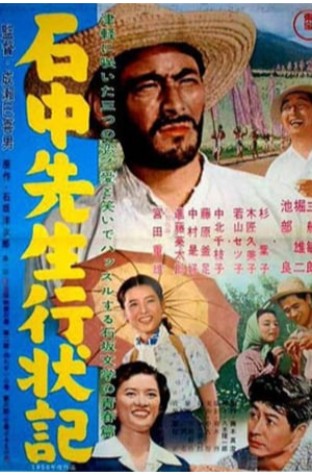
Review Website Ranks:
- Rotten Tomatoes Critic: 2
- Rotten Tomatoes Users: 21
- IMDB User Review Score: 53
- Letterboxd User Score: 53
Three humorous love stories set in rural Japan.
54 ) Five Men in a Circus (1935)
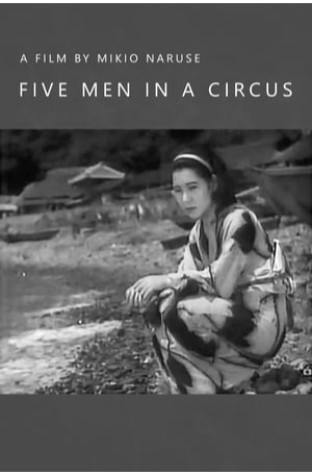
Review Website Ranks:
- Rotten Tomatoes Critic: 2
- Rotten Tomatoes Users: 21
- IMDB User Review Score: 57
- Letterboxd User Score: 49
The main focus is on the 5 member band of a small circus as it runs into problems while touring rural Japan. It also pays lots of attention to the two daughters of the aging and irascible ringmaster-circus owner. The high points are the sound (and score) and cinematography featuring a lot of vertiginous panning (appropriate – as high wire trapeze artists are also an important element in the film). A fascinating side-light on 30s Japan.
54 ) The Whole Family Works (1939)
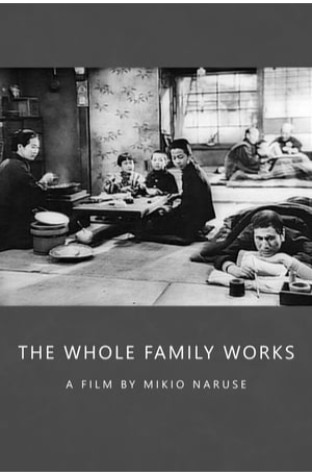
Review Website Ranks:
- Rotten Tomatoes Critic: 2
- Rotten Tomatoes Users: 21
- IMDB User Review Score: 57
- Letterboxd User Score: 49
The Whole Family Works, Mikio Naruse’s adaptation of a Sunao Tokunaga novel, feels more of a piece with the writer/director’s quietly observant and psychologically charged later work. For the Naruse-familiar, it is an anomaly only in its placement within his filmography—indeed, this could be a film made by the elder, stasis-minded Naruse momentarily inhabiting, through a metaphysical twist of fate, his stylistically exuberant younger self. Set in depression-era Japan around the time of the Sino-Japanese War (which the director evokes, during a brief dream sequence, by dissolving between children’s war games and actual adult warfare), The Whole Family Works gently observes a family coming apart at the seams. Ishimura (Musei Tokugawa) is the jobless father of nine children.
53 ) Both You and I (1946)
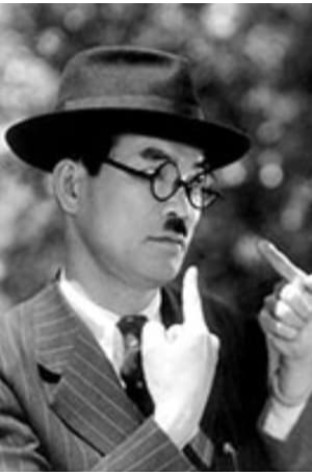
Review Website Ranks:
- Rotten Tomatoes Critic: 2
- Rotten Tomatoes Users: 21
- IMDB User Review Score: 48
- Letterboxd User Score: 53
A comedy about two salarymen who routinely degrade themselves for their boss.
52 ) White Beast (1950)
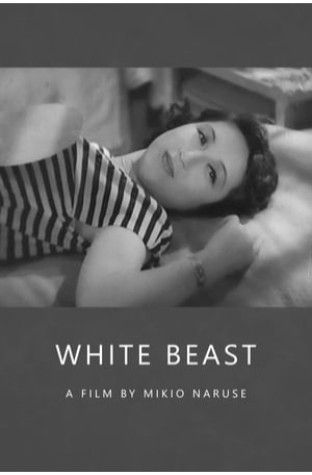
Review Website Ranks:
- Rotten Tomatoes Critic: 2
- Rotten Tomatoes Users: 21
- IMDB User Review Score: 53
- Letterboxd User Score: 43
The critical establishment was clearly not prepared to accept a woman’s prison film featuring former prostitutes recovering from venereal diseases, unwanted pregnancies, and estranged lovers. With its cat fights, hysterical tantrums, film noir lighting, and dramatic music, White Beast is indicative of the new influences of the Hollywood psychological thriller on Naruse. Caged (John Cromwell, 1950) initiated a cycle of women’s prison movies in the United States that may or may not have been shown in Japan, but the stylistics of White Beast draw on the same paranoid woman’s films and film noir conventions that preceded the American cycle.
48 ) Learn from Experience, Part One (1937)
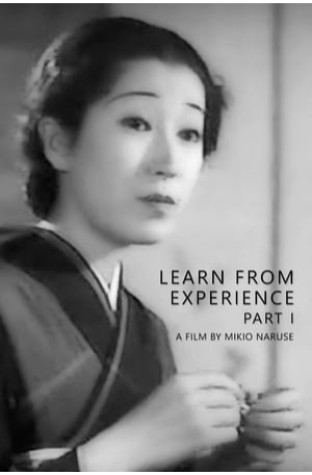
Review Website Ranks:
- Rotten Tomatoes Critic: 2
- Rotten Tomatoes Users: 21
- IMDB User Review Score: 38
- Letterboxd User Score: 53
Part 1 of a 2-part romance based on a story by noted author Kikuchi Kan. The central character here is Toyomi (played by Takako IRIE, star of Mizoguchi’s “Water Magician), a rich young woman in love with Shintaro (Minoru TAKADA), a rich young man. Unfortunately, Shintaro’s father is in the process of arranging a marriage for him with Yurie (Chieko TAKEHISA), the scion of an even wealthier family. In order to avoid this, the two young lovers flee to Tokyo to live together. When Shintaro comes back to proclaim his intent to marry Toyomi, his father browbeats him into attending the long-arranged marriage meeting with Yurie. While Shintaro is back home, Toyomi goes on a vacation trip with her closest chum, Michiko (Yumeko AIZOME). At a class reunion, Toyomi is to distressed (at not having heard from Shintaro for so long), she doesn’t go out on the town with her classmates. Michiko, however, runs into Shintaro and Yurie (also out on the town), and pulling him aside, demands an explanation.
48 ) A Woman’s Sorrows (1937)
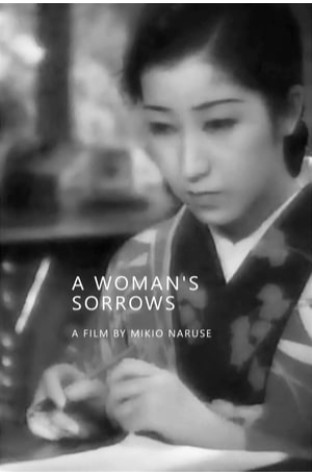
Review Website Ranks:
- Rotten Tomatoes Critic: 2
- Rotten Tomatoes Users: 21
- IMDB User Review Score: 48
- Letterboxd User Score: 43
Japanese domestic drama.
48 ) Avalanche (1937)
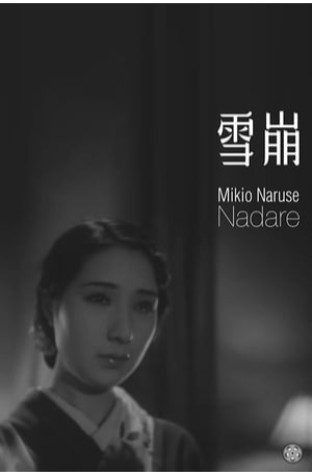
Review Website Ranks:
- Rotten Tomatoes Critic: 2
- Rotten Tomatoes Users: 21
- IMDB User Review Score: 48
- Letterboxd User Score: 43
This film, directed by Mikio Naruse, is a study of a one-year marriage that begins to crumble. A married man is torn between the love of his wife, and the attraction to a cousin of his wife. (This film is notable for having two giants of Japanese cinema among its employees, Ishiro Honda and Akira Kurosawa).
48 ) A Tale of Archery at the Sanjusangendo (1945)
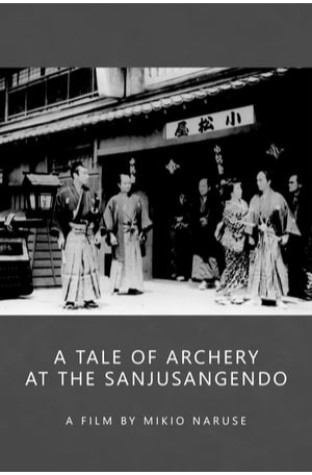
Review Website Ranks:
- Rotten Tomatoes Critic: 2
- Rotten Tomatoes Users: 21
- IMDB User Review Score: 48
- Letterboxd User Score: 43
In A Tale of Archery, young, timid bowmaster Kazuma (Akitake Kôno) seeks to beat the archery record set by Hoshino Kanzaemon, a mysterious figure who, it is rumored, drove the previous champion (Kazuma’s father) to suicide. Possessed of much raw talent, Kazuma is also very much a coward, holing himself up in an inn run by the kindly Okinu (Kinuyo Tanaka) and generally avoiding confrontation of any sort. Despite his clandestine manner, enough of the locals know of Kazuma’s purpose and an attempt is made on his life. He is saved by Karatsu Kanbei (Kazuo Hasegawa), a samurai who offers to help Kazuma hone his archery skills, though it soon becomes clear that this apparently selfless stranger has several potentially shady ulterior motives.
47 ) The Angry Street (1950)
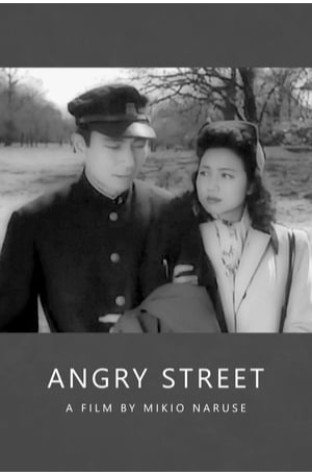
Review Website Ranks:
- Rotten Tomatoes Critic: 2
- Rotten Tomatoes Users: 21
- IMDB User Review Score: 42
- Letterboxd User Score: 43
The Angry Street includes a great deal of location shooting in the rebuilt city, including downtown streets, residential neighborhoods, the campus of the University of Tokyo, and the high life of jazzy dance halls. Sudo (Hara Yasumi) and Mori (Uno Jukichi) are two university students who make money by picking up rich girls in dance clubs and conning them into giving them cash. Mori is the brains of the operation, and Sudo is the suave dancer who picks up the girls. Over the course of the film, Sudo becomes involved with three different girls and is drawn into the gangster milieu, which he seems unable to resist even though he is responsible for his mother, grandmother, and sister, Masako (Wakayama Setsuko). In this world of bad boys and girls, Masako is the pillar of strength and moral virtue who finally enables Mori to straighten out.
46 ) The Girl in the Rumor (1935)
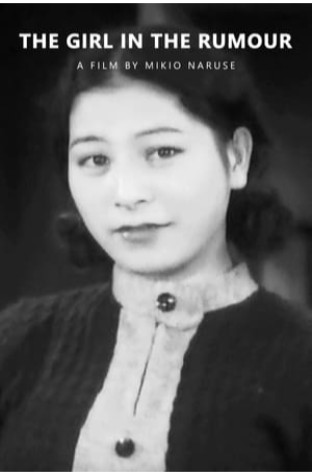
Review Website Ranks:
- Rotten Tomatoes Critic: 2
- Rotten Tomatoes Users: 21
- IMDB User Review Score: 48
- Letterboxd User Score: 34
A story of two sisters, the older being more traditional, the younger a “moga” (“modern girl”). Their widowed father runs the family sake shop — but is running into financial trouble (causing him to make some bad decisions). Meanwhile, his long-time mistress’s little business is also on the rocks. Amidst this, the older sister is introduced to a well-off suitor (a university boy who is much more intrigued by the less traditional “little sister”). Add a dotty grandfather, an officious uncle and busy body neighbors.
45 ) Tsuruhachi and Tsurujiro (1938)
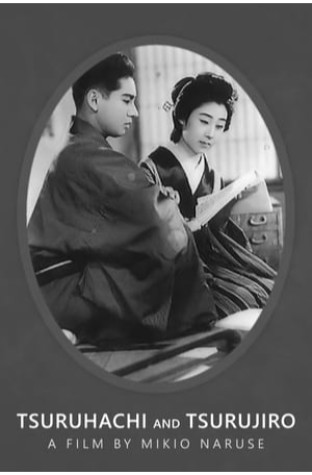
Review Website Ranks:
- Rotten Tomatoes Critic: 2
- Rotten Tomatoes Users: 21
- IMDB User Review Score: 38
- Letterboxd User Score: 43
Drama about a couple and how they found themselves related with music, their egos and each other.
42 ) No Blood Relation (1932)
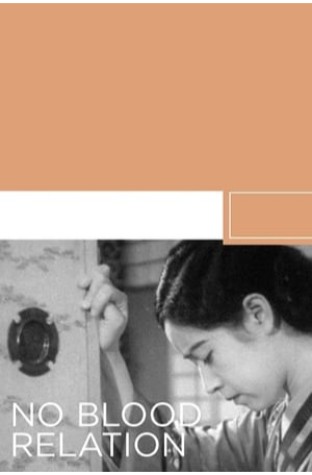
Review Website Ranks:
- Rotten Tomatoes Critic: 2
- Rotten Tomatoes Users: 21
- IMDB User Review Score: 42
- Letterboxd User Score: 34
In No Blood Relation, a gripping early example of Mikio Naruse’s cinematic boldness, featuring a screenplay by Ozu’s famed collaborator Kogo Noda, an actress returns to Tokyo after a successful stint in Hollywood to reclaim—with the help of her gangster brother—the daughter she abandoned years before.
42 ) Morning’s Tree-Lined Street (1936)
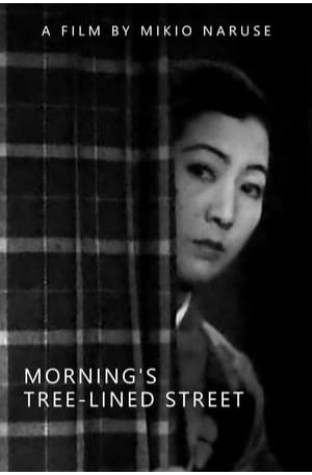
Review Website Ranks:
- Rotten Tomatoes Critic: 2
- Rotten Tomatoes Users: 21
- IMDB User Review Score: 42
- Letterboxd User Score: 34
As suggested by the title, this film takes up the theme of the city, beginning with a series of traveling shots from Chiyo’s point o view on a bus leaving the countryside and entering the metropolitan cityscape. After some fruitless job hunting in downtown Tokyo, Chiyo accepts a job as a bar hostess in Shiba ward. Well away from glamorous Asakusa and Ginza, this is a neighborhood bar where the women are dirt poor, each having only one kimono to their name….
42 ) Dancing Girl (1951)
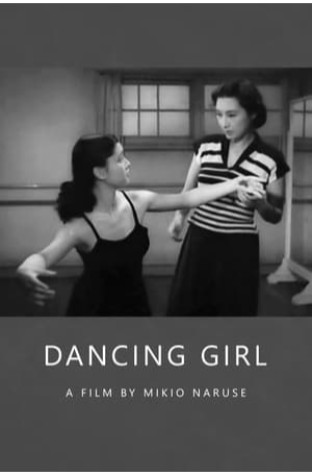
Review Website Ranks:
- Rotten Tomatoes Critic: 2
- Rotten Tomatoes Users: 21
- IMDB User Review Score: 42
- Letterboxd User Score: 34
The troubled relationship between a writer and his ballet teacher wife, who has for years loved another man, finally leads to the breakup of the family.
41 ) Street Without End (1934)
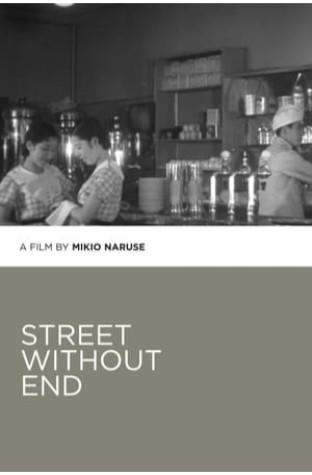
Review Website Ranks:
- Rotten Tomatoes Critic: 2
- Rotten Tomatoes Users: 21
- IMDB User Review Score: 38
- Letterboxd User Score: 34
Mikio Naruse’s final silent film is a gloriously rich portrait of a waitress, Sugiko, whose life, despite a host of male admirers and even some intrigued movie talent scouts, ends up taking a suffocatingly domestic turn after a wealthy businessman accidentally hits her with his car
38 ) The First Kiss (1955)
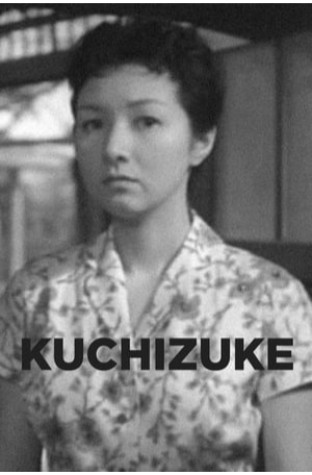
Review Website Ranks:
- Rotten Tomatoes Critic: 2
- Rotten Tomatoes Users: 21
- IMDB User Review Score: 18
- Letterboxd User Score: 53
Portmanteau film about young lovers.
38 ) A Whistle in My Heart (1959)
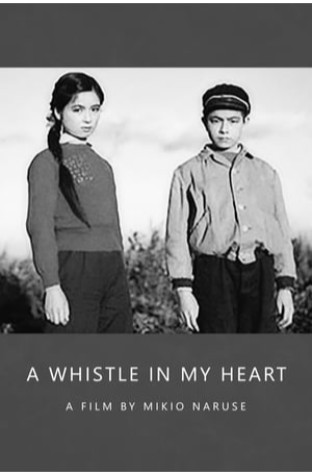
Review Website Ranks:
- Rotten Tomatoes Critic: 2
- Rotten Tomatoes Users: 21
- IMDB User Review Score: 18
- Letterboxd User Score: 53
The story is about the social problems faced by Japan’s indigenous Ainu, mostly centered on the reactions of the characters to their oppressed state.
38 ) The Wiser Age (1962)
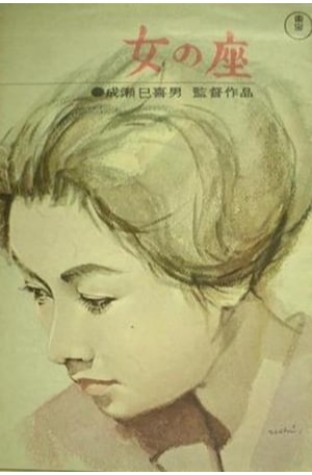
Review Website Ranks:
- Rotten Tomatoes Critic: 2
- Rotten Tomatoes Users: 21
- IMDB User Review Score: 18
- Letterboxd User Score: 53
Drama about the lives of the five daughters and daughter-in-law of a store owner.
37 ) Okuni and Gohei (1952)
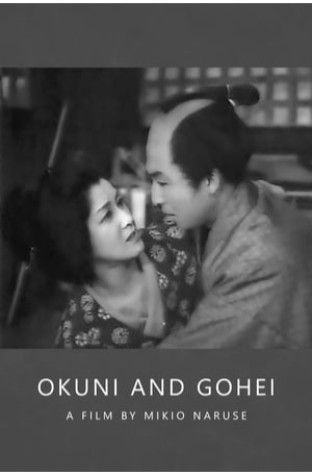
Review Website Ranks:
- Rotten Tomatoes Critic: 2
- Rotten Tomatoes Users: 21
- IMDB User Review Score: 42
- Letterboxd User Score: 27
Okuni and Gohei is about a high-born woman, Okuni (Michiyo Kogure), who travels around the country with Gohei (Tomoemon Otani), a samurai retainer who is in service to her. They are in search of Tomonojo (Sô Yamamura), who has killed the man who was Okuni’s husband and Gohei’s master, and they cannot return to their lord’s home until they have fulfilled their duty of hunting down and killing Tomonojo.
35 ) Three Sisters with Maiden Hearts (1935)
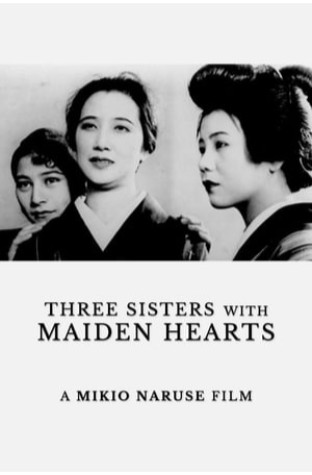
Review Website Ranks:
- Rotten Tomatoes Critic: 2
- Rotten Tomatoes Users: 21
- IMDB User Review Score: 31
- Letterboxd User Score: 34
Three sisters earn money for their bossy mother by being samisen street musicians. This means mainly playing a banjo type instrument for tips in bars…
35 ) The Lovelorn Geisha (1960)
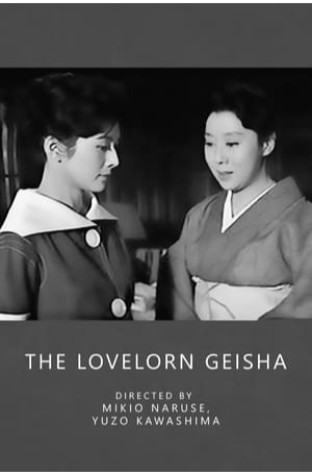
Review Website Ranks:
- Rotten Tomatoes Critic: 2
- Rotten Tomatoes Users: 21
- IMDB User Review Score: 31
- Letterboxd User Score: 34
A woman and her daughter are in love with the same man, a chef at the restaurant that the mother manages. He is slightly crippled from frostbite in his years in Siberian labor camps and considers himself “already dead.”
34 ) Ginza Cosmetics (1951)
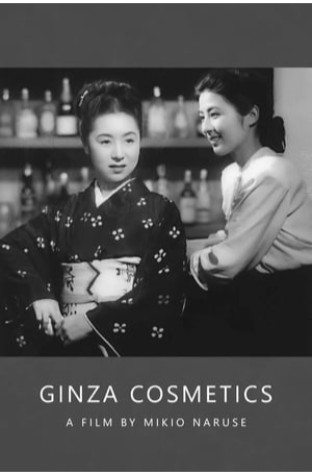
Review Website Ranks:
- Rotten Tomatoes Critic: 2
- Rotten Tomatoes Users: 20
- IMDB User Review Score: 38
- Letterboxd User Score: 27
Italy is usually cited as the anchor of the neo-realist movement in cinema, but Mikio Naruse’s Ginza Cosmetics (1951) is a reminder that Japan had its own output equally rooted in realism. Set in Tokyo’s Ginza district, this low-key, lyrical unassuming account of a few days in the life of a luckless geisha (Kinuyo Tanaka), as she struggles to make a living for herself and her young son, has few dramatic highs or artificial moments, but possesses a startlingly vivid power in its slice-of-life texture.
33 ) The Song Lantern (1943)
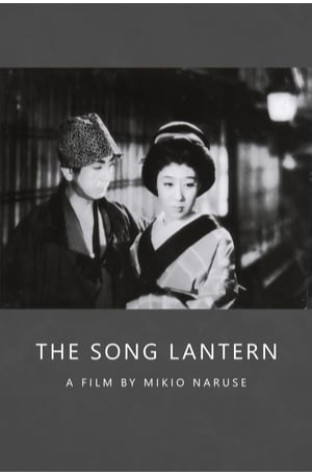
Review Website Ranks:
- Rotten Tomatoes Critic: 2
- Rotten Tomatoes Users: 21
- IMDB User Review Score: 25
- Letterboxd User Score: 34
A self-absorbed young actor humiliates an elderly Noh performer, who then commits suicide. His act of cruelty compels his father to disown him, leading the once promising actor to a life on the streets. But his desire to win back the respect of his father and the affection of the dead actor’s daughter pushes him toward a more noble existence. Naruse employed a delicately structured mise-en-scene in this family melodrama, which evokes the work of Josef von Sternberg.
30 ) Hideko the Bus Conductress (1941)
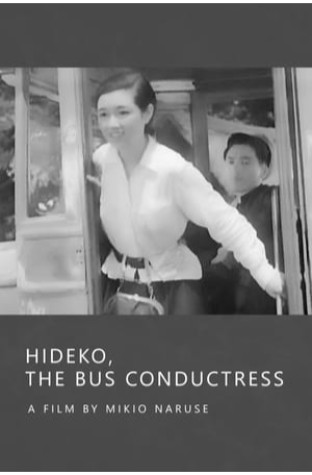
Review Website Ranks:
- Rotten Tomatoes Critic: 2
- Rotten Tomatoes Users: 21
- IMDB User Review Score: 31
- Letterboxd User Score: 27
Young Hideko hits on the idea to run bus tours in rural Japan.
30 ) Little Peach (1958)
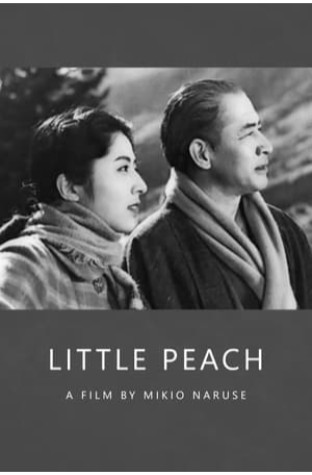
Review Website Ranks:
- Rotten Tomatoes Critic: 2
- Rotten Tomatoes Users: 21
- IMDB User Review Score: 31
- Letterboxd User Score: 27
Anzukko (Little Peach) is the daughter of a successful writer. She turns down each one of her suitors, until she marries a beginning writer named Ryokichi. Their life quickly sinks into despair.
30 ) Wife (1953)
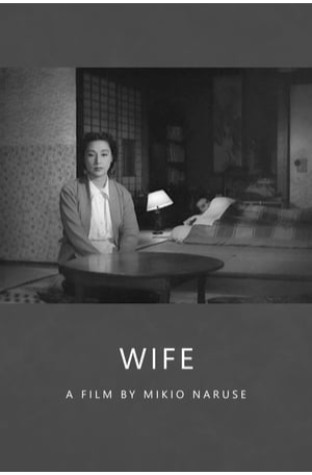
Review Website Ranks:
- Rotten Tomatoes Critic: 2
- Rotten Tomatoes Users: 18
- IMDB User Review Score: 42
- Letterboxd User Score: 19
Ten years into a marriage, the wife is disappointed by the husband’s lack of financial success, meaning she has to work and can’t treat herself and the husband finds the wife slovenly and mean-spirited: she neither cooks not cleans particularly well and is generally disagreeable. In turn, he alternately ignores her and treats her as a servant. Neither is particularly happy, not helped by their unsatisfactory lodgers. The husband is easily seduced by an ex-colleague, a widow with a small child who needs some security, and considers leaving his wife.
27 ) Sincerity (1939)
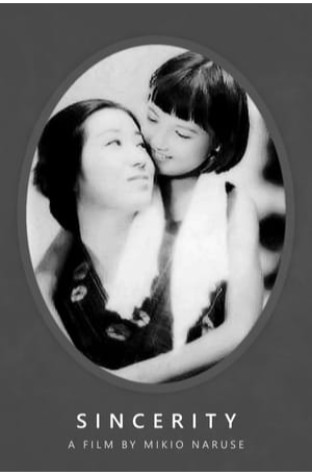
Review Website Ranks:
- Rotten Tomatoes Critic: 2
- Rotten Tomatoes Users: 21
- IMDB User Review Score: 18
- Letterboxd User Score: 34
Drama about the relationship of a mother and her daughters.
27 ) Travelling Actors (1940)
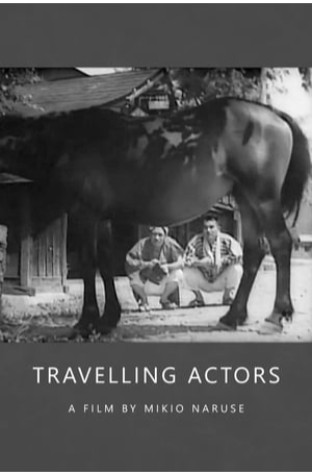
Review Website Ranks:
- Rotten Tomatoes Critic: 2
- Rotten Tomatoes Users: 21
- IMDB User Review Score: 25
- Letterboxd User Score: 27
This film depicts a troupe of wandering kabuki players traveling through rural Japan.
27 ) Moment of Terror (1966)
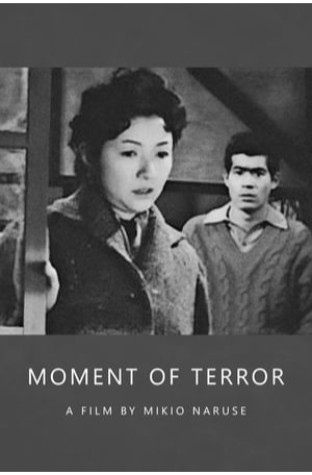
Review Website Ranks:
- Rotten Tomatoes Critic: 2
- Rotten Tomatoes Users: 21
- IMDB User Review Score: 25
- Letterboxd User Score: 27
When an only child is struck by a car and dies, the child’s mother (Hideko Takamine) seeks vengeance against the driver in this thrilling drama. The car was driven by the wife of a company president who is having an affair. The woman’s husband manages to buy silence about the incident, but the victim’s mother discovers the identity of the driver. After she secures a job in the home of the company president and his philandering spouse, the woman plans to murder the couple’s son when he reaches the age of her late son.
26 ) Husband and Wife (1953)
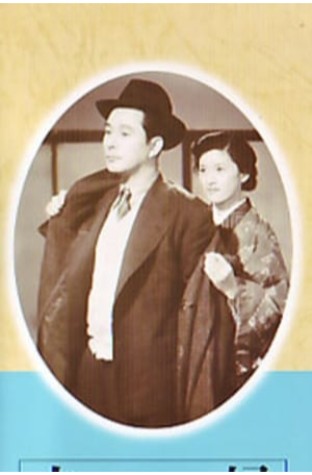
Review Website Ranks:
- Rotten Tomatoes Critic: 2
- Rotten Tomatoes Users: 21
- IMDB User Review Score: 31
- Letterboxd User Score: 19
A married couple looking for an apartment move in with the husband’s co-worker, a widower. The husband becomes jealous of the widower and his wife.
24 ) Spring Awakens (1947)
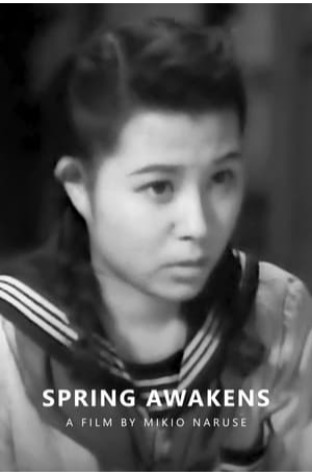
Review Website Ranks:
- Rotten Tomatoes Critic: 2
- Rotten Tomatoes Users: 21
- IMDB User Review Score: 17
- Letterboxd User Score: 27
Slice of life film centered around a couple of years in the life of a rural high school girl.
24 ) Untamed Woman (1957)
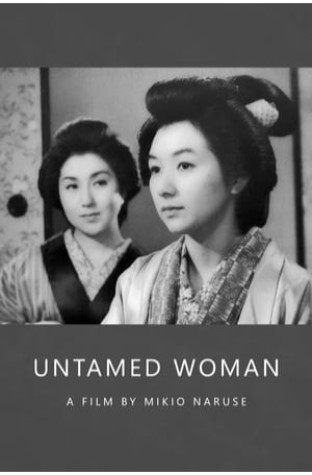
Review Website Ranks:
- Rotten Tomatoes Critic: 2
- Rotten Tomatoes Users: 21
- IMDB User Review Score: 31
- Letterboxd User Score: 13
Set in the Taishō period of Japan (dating from 1912 to 1926), Untamed follows the fiery Oshima (in a superbly eccentric performance by Takamine) as she passes from one suitor to another, a series of calamities befalling her along the way. Characteristic of Naruse’s work, urban and rural settings are juxtaposed: the moody Tokyo streets against a majestic mountain village. At each point, the various situations Oshima is caught in seem uncannily bound up with her surroundings. It’s worth noting that the film, while not widely known, is singled out for praise by critic Chris Fujiwara. (University of Chicago Doc Films)
22 ) Sudden Rain (1956)
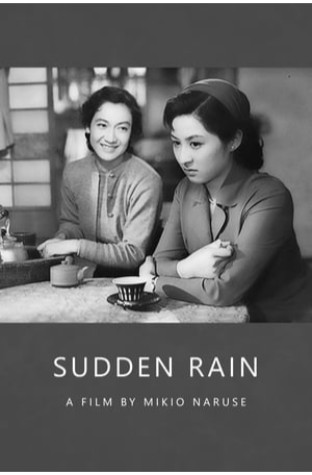
Review Website Ranks:
- Rotten Tomatoes Critic: 2
- Rotten Tomatoes Users: 21
- IMDB User Review Score: 25
- Letterboxd User Score: 13
Setsuko Hara plays Fumiko, whose unsuccessful marriage has made her become more and more cynical. When her niece, Ayako visits and complains about her own marriage, she is unsurprised. Meanwhile, a new couple, whose marriage is similarly unblissful, moves in next door. The two couples create a very awkward bond that could ruin both marriages, but everyone seems to be aware and nobody cares either way. [Cinema Talk Blog]
22 ) The Other Woman (1961)
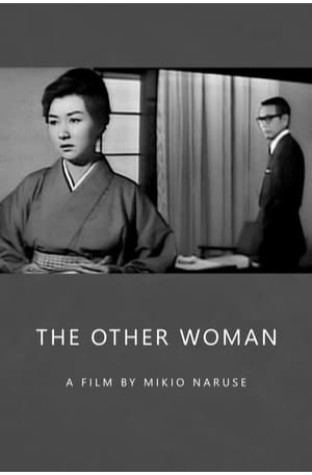
Review Website Ranks:
- Rotten Tomatoes Critic: 2
- Rotten Tomatoes Users: 21
- IMDB User Review Score: 31
- Letterboxd User Score: 7
In “The Other Woman” the children of a distinguished professor find that the woman they have come to regard as their racy and slightly disreputable Ginza aunt is really their mother.
21 ) A Wife’s Heart (1956)
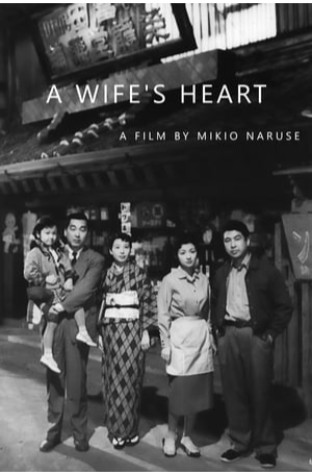
Review Website Ranks:
- Rotten Tomatoes Critic: 2
- Rotten Tomatoes Users: 21
- IMDB User Review Score: 18
- Letterboxd User Score: 19
Kiyoko (Takamine Hideko) and her husband want to open a coffee shop. She becomes increasingly close to the bank clerk (Mifune Toshiro) she’s asked for a loan.
20 ) Every-Night Dreams (1933)

Review Website Ranks:
- Rotten Tomatoes Critic: 2
- Rotten Tomatoes Users: 10
- IMDB User Review Score: 25
- Letterboxd User Score: 19
In the formally ravishing Every-Night Dreams, set in the dockside neighborhoods of Tokyo, a single mother works tirelessly as a Ginza bar hostess to ensure a better life for her young son—until her long-lost husband returns.
19 ) Older Brother, Younger Sister (1953)
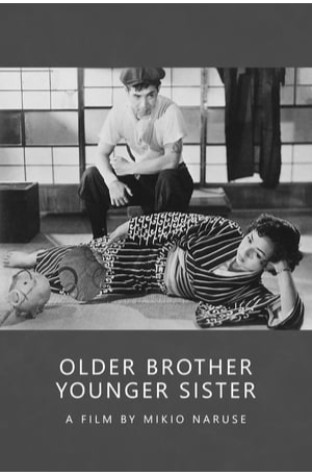
Review Website Ranks:
- Rotten Tomatoes Critic: 2
- Rotten Tomatoes Users: 21
- IMDB User Review Score: 11
- Letterboxd User Score: 19
The eldest daughter of a rural family Mon returns home from Tokyo pregnant after an affair with a college student Kobata, which causes a scandal that will threaten the marriage prospects of the younger sister San, in her cash-strapped family. The ill-tempered eldest brother Inokichi decides to take on the role of disciplinarian, with harrowing results.
16 ) A Woman’s Life (1963)
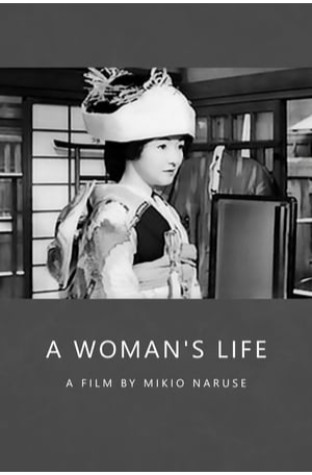
Review Website Ranks:
- Rotten Tomatoes Critic: 2
- Rotten Tomatoes Users: 21
- IMDB User Review Score: 8
- Letterboxd User Score: 19
A woman remember’s her own marriage when dealing with the love life of her son.
16 ) The Thin Line (1966)
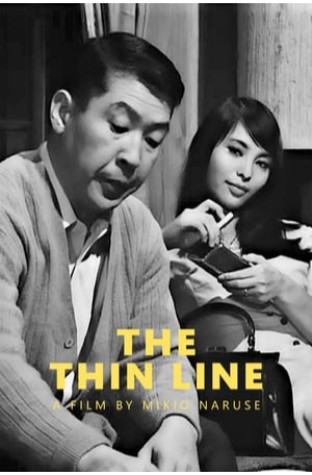
Review Website Ranks:
- Rotten Tomatoes Critic: 2
- Rotten Tomatoes Users: 15
- IMDB User Review Score: 14
- Letterboxd User Score: 19
Tashiro (Keiju Kobayashi) coincidentally meets his best friend Sugimoto (Tatsuya Mihashi) in a bar very close to the apartment in which Sugimoto’s wayward wife is found dead. Although Tashiro is not a suspect in the police investigation, he is racked with guilt and confesses to his wife, Masako (Michiyo Aratama). In an effort to further relieve his tortured sense of guilt, he then confesses to Sugimoto. Neither his wife nor his friend can believe that he could have been involved.
16 ) Wife! Be Like a Rose! (1935)
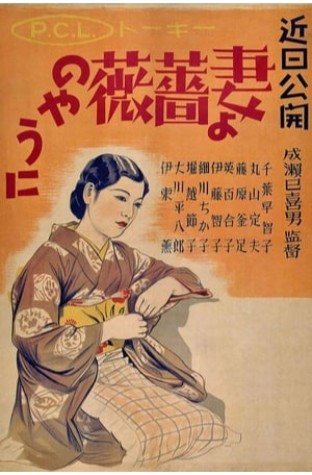
Review Website Ranks:
- Rotten Tomatoes Critic: 2
- Rotten Tomatoes Users: 21
- IMDB User Review Score: 14
- Letterboxd User Score: 13
A Tokyo salary girl lives with very serious bluestocking haiku-writing mother. The salary girl seeks to marry the attendant dish but needs an absent father to act as the go-between…
15 ) Daughters, Wives and a Mother (1960)
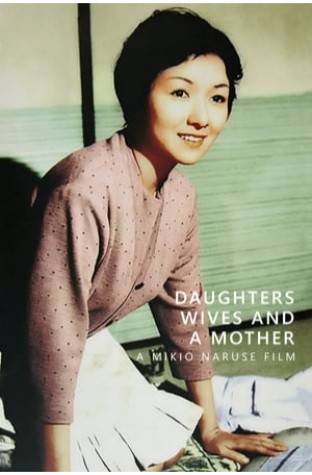
Review Website Ranks:
- Rotten Tomatoes Critic: 2
- Rotten Tomatoes Users: 16
- IMDB User Review Score: 18
- Letterboxd User Score: 13
This film features a large extended family (and associates) even more extensive than the one portrayed by Ozu in “End of Summer”. The central character is Setsuko Hara — a poised middle-aged woman, whose wealthy (and prestigious) husband dies at the outset of the action, leaving her widowed but holding the proceeds of a million yen insurance policy. Being childless, her former in-laws have no objection to her return to her own family.
14 ) Apart from You (1933)
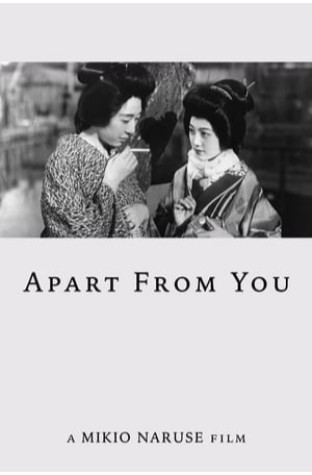
Review Website Ranks:
- Rotten Tomatoes Critic: 2
- Rotten Tomatoes Users: 1
- IMDB User Review Score: 25
- Letterboxd User Score: 19
For Apart from You, Mikio Naruse turned his camera on the lives of working women, which he would continue to do throughout his long career. In this gently devastating drama, a critical breakthrough for the director, he contrasts the life of an aging geisha, whose angry teenage son is ashamed of her profession, with that of her youthful counterpart, a lovely young girl resentful of her family for forcing her into a life of ignominy.
13 ) The Approach of Autumn (1960)
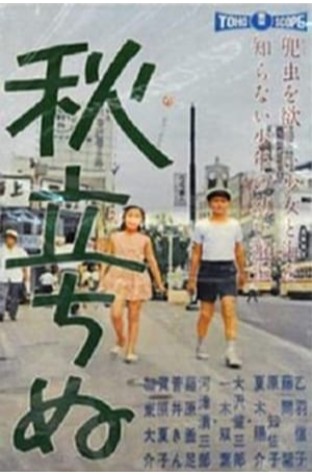
Review Website Ranks:
- Rotten Tomatoes Critic: 2
- Rotten Tomatoes Users: 17
- IMDB User Review Score: 18
- Letterboxd User Score: 7
A single mother from the country raising a 6th grade boy comes to Tokyo, leaves the boy to live with his uncle’s family, runs a struggling grocery store, and works a local inn. The boy befriends a girl, the daughter of the innkeeper…
11 ) A Wanderer’s Notebook (1962)
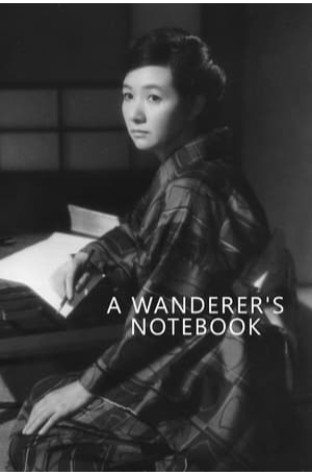
Review Website Ranks:
- Rotten Tomatoes Critic: 2
- Rotten Tomatoes Users: 6
- IMDB User Review Score: 11
- Letterboxd User Score: 13
Considered one of the finest late Naruses and a model of film biography, A Wanderer’s Notebook features remarkable performances by Hideko Takamine – Phillip Lopate calls it “probably her greatest performance” – and Kinuyo Tanaka as mother and daughter living from hand to mouth in Twenties Tokyo. Based on the life and career of Fumiko Hayashi, the novelist whose work Naruse adapted to the screen several times, A Wanderer’s Notebook traces her bitter struggle for literary recognition in the first half of the twentieth century – her affairs with feckless men, the jobs she took to survive (peddler, waitress, bar maid), and her arduous, often humiliating attempts to get published in a male-dominated culture.
11 ) Late Chrysanthemums (1954)
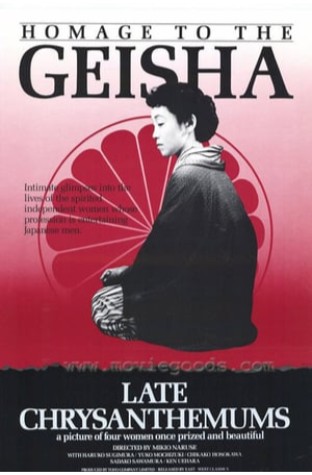
Review Website Ranks:
- Rotten Tomatoes Critic: 2
- Rotten Tomatoes Users: 9
- IMDB User Review Score: 14
- Letterboxd User Score: 7
What is the life of a Geisha like once her beauty has faded and she has retired? Kin has saved her money, and has become a wealthy money-lender, spending her days cold-heartedly collecting debts. Even her best friends, Tomi, Nobu, and Tamae, who were her fellow Geisha, are now indebted to her. For all of them, the glamor of their young lives has passed; Tomi and Tamae have children, but their children have disappointed them. Kin has two former lovers who still pursue her; one she wants to see, and the other she doesn’t. But even the one she remembers fondly, when he shows up, proves to be a disappointment.
9 ) Floating Clouds (1955)
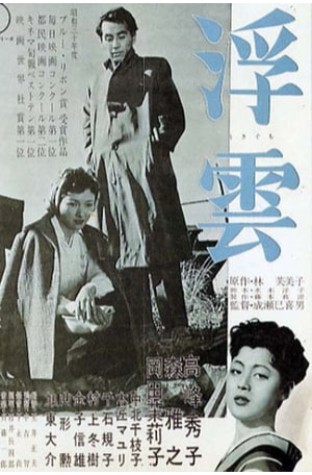
Review Website Ranks:
- Rotten Tomatoes Critic: 2
- Rotten Tomatoes Users: 14
- IMDB User Review Score: 6
- Letterboxd User Score: 5
A married Japanese forester during WWII is sent to Indochina to manage forests. He meets a young Japanese typist and promises to leave his wife. He doesn’t and after the war, she turns up and the affair resumes.
9 ) Summer Clouds (1958)
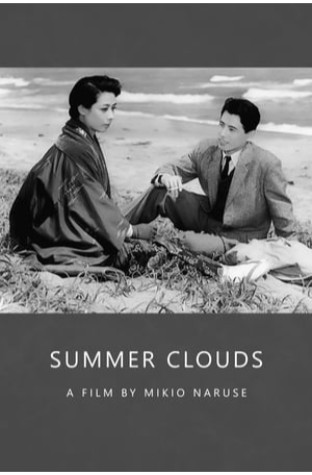
Review Website Ranks:
- Rotten Tomatoes Critic: 2
- Rotten Tomatoes Users: 1
- IMDB User Review Score: 11
- Letterboxd User Score: 13
A war widow with a young boy manages a farm with her bossy mother-in-law. When a reporter comes to interview her, the two begin an affair. He turns out to be married and won’t leave his wife. Her older brother tries to marry off his children and hang on to/ extend his farm through an advantageous marriage in the face of threatened land confiscation and the desire of his children to get comfortable urban jobs instead of the backbreaking work in the paddy fields under parental control.
8 ) Flowing (1956)
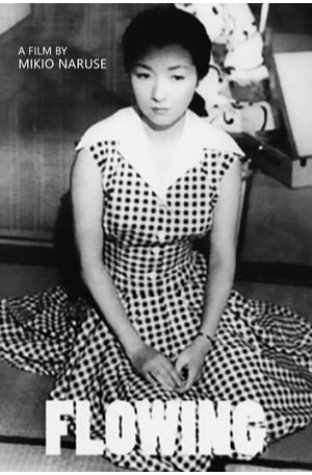
Review Website Ranks:
- Rotten Tomatoes Critic: 2
- Rotten Tomatoes Users: 10
- IMDB User Review Score: 6
- Letterboxd User Score: 7
Otsuta is running the geisha house Tsuta in Tokyo. Her business is heavily in debt. Her daughter Katsuyo doesn’t see any future in her mothers trade in the late days of Geisha. But Otsuta will not give up. This film portraits the day time life of geisha when not entertaining customers.
6 ) Repast (1951)
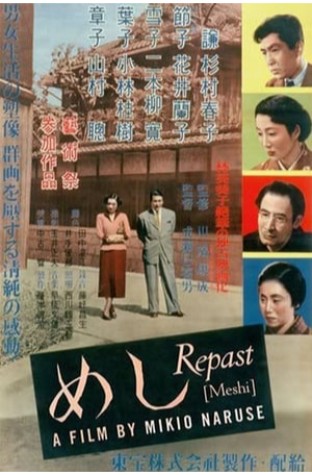
Review Website Ranks:
- Rotten Tomatoes Critic: 2
- Rotten Tomatoes Users: 10
- IMDB User Review Score: 4
- Letterboxd User Score: 7
Michiyo lives in the small place Osaka and is not happy with her marriage, all she does is cook and clean for her husband.
6 ) Lightning (1952)
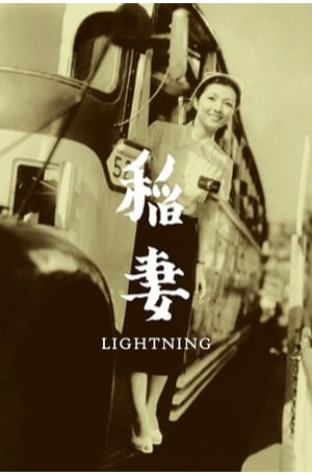
Review Website Ranks:
- Rotten Tomatoes Critic: 2
- Rotten Tomatoes Users: 8
- IMDB User Review Score: 8
- Letterboxd User Score: 5
Mikio Naruse’s second adaptation of a novel by Fumiko Hayashi stars Hideko Takamine, the director’s frequent muse, as bus conductress Kiyoko Komori, the youngest daughter in a family of squabbling half-siblings. All the children are products of different fathers, though they share the same mother: a tragically weak-willed woman named Osei (Kumeko Urabe). The familial tension only increases when the husband of one daughter dies and leaves behind a substantial insurance policy, so Kiyoko abandons them to their quarrels and makes a go of it on her own, though she finds she can’t leave her mother behind so easily.
5 ) Mother (1952)
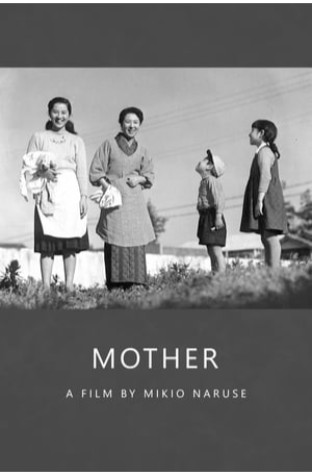
Review Website Ranks:
- Rotten Tomatoes Critic: 2
- Rotten Tomatoes Users: 1
- IMDB User Review Score: 8
- Letterboxd User Score: 7
Okaasan is the story of a poor, working class mother with a sick husband who sacrifices herself to support her family in suburban Tokyo. The film defines “Shomin Geki,” a Japanese film genre that features realistic depiction of the economic underclass, told with elements of light comedy and melodrama. Okaasan is the best-known work of director Mikio Naruse, hailed by Japanese film historians as an equal of Kurosawa, Ozu and Mizoguchi, but under-appreciated in the West
4 ) Yearning (1964)
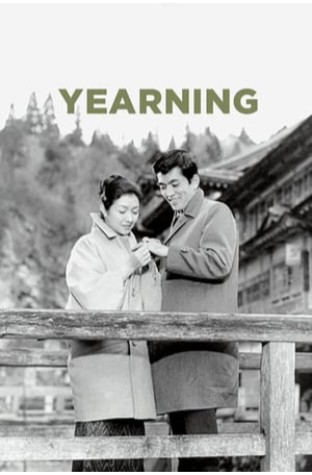
Review Website Ranks:
- Rotten Tomatoes Critic: 2
- Rotten Tomatoes Users: 10
- IMDB User Review Score: 1
- Letterboxd User Score: 1
After a bombing raid destroys the family store and her husband, Reiko rebuilds and runs the shop out of love stopped short by destruction.
3 ) Sound of the Mountain (1954)
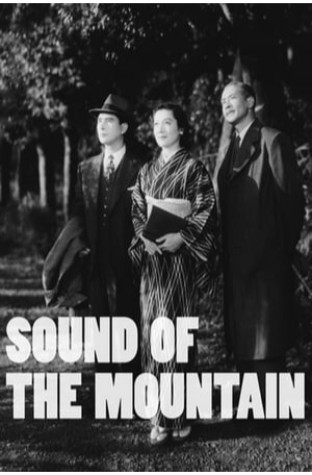
Review Website Ranks:
- Rotten Tomatoes Critic: 2
- Rotten Tomatoes Users: 5
- IMDB User Review Score: 3
- Letterboxd User Score: 3
An ingratiating bride develops warm ties to her father-in-law while her cold husband blithely slights her for another woman.
1 ) When a Woman Ascends the Stairs (1960)
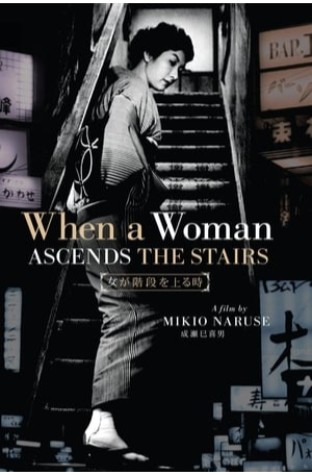
Review Website Ranks:
- Rotten Tomatoes Critic: 1
- Rotten Tomatoes Users: 6
- IMDB User Review Score: 1
- Letterboxd User Score: 2
Keiko, whom everyone calls Mama, narrates her story: she’s a hostess on the Ginza, 30, a widow. She describes life’s vicious cycle: acting cheerful around drunks, dressing and living well to convey confidence, needing money for these expenses and for her demanding mother and brother, and knowing she’s growing older. She’s of an age when she must choose: to seek marriage (difficult given her tarnished occupation), to be a kept woman, or to borrow money to buy a bar of her own. Each route has dangers, including investors demanding a return on their loans. Keiko has a quiet dignity that attracts men, but are they what they seem? Does she actually have choices?
1 ) Two in the Shadow (1967)
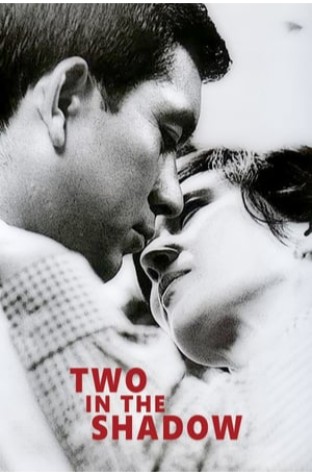
Review Website Ranks:
- Rotten Tomatoes Critic: 2
- Rotten Tomatoes Users: 1
- IMDB User Review Score: 4
- Letterboxd User Score: 3
A man is involved in a fatal car accident, and though he is blameless, his company transfers him to a remote branch in a small town. Before he leaves, he gives the man’s widow a large sum of money that she uses to move back to her hometown.
